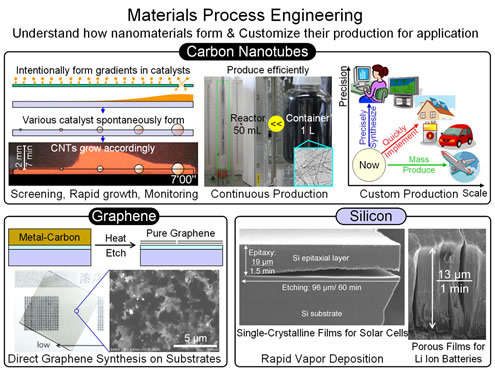 Open Nav
Open Nav
 Open Nav
Open Nav
Nanotechnology brings innovations to the society widely in energy/environment, information/communication, etc., by adding novel functions to materials by controlling their structures at nanometer-scale. We are trying to establish the base of materials nanotechnology.
Let us think about the future clean energy systems. For large-scale electric power generation by solar cells, efficient use of high purity silicon is the key so that we are trying to improve the efficiency several-ten times by making single-crystalline thin films. Transparent electrodes are important for both solar cells (yielding electricity from light) and displays & lightings (generating lights from electricity), and we try to replace metal oxide semiconductors using rare-elements with carbon nanotubes or graphene. Nanotube-silicon hybrids are promising to realize Li ion batteries of larger capacities for (hybrid) electric vehicles. In this way, nanotechnology can bring innovations widely even if we use abundant carbon and silicon elements only, and contributes to sustainable technological society.
But nanomaterials can never be made in macro-scale if we artificially manipulate atoms/molecules one-by-one. Self-organization, i.e. spontaneous formation of materials from numerous atoms/molecules, is the key. We are trying to fundamentally understand the processes of chemical reactions of atoms/molecules, formation of nanostructures, and evolution of higher-order structures. Based on the fundamental understandings with flexible thinking and idea, we are proposing and developing novel processes for nanomaterials and their devices.
Carbon Nanotubes (CNTs) are a unique 1D nanomaterial quite thin ~nm and long ~mm. Extensive research made in physics/science fields clarified many unique properties and potential applications for them. On the other hand, as their price (single-wall CNTs are more expensive than gold) shows, their fabrication process is still under development and their practical applications are very much limited. Chemistry & engineering should lead the innovations for their production and manufacturing. We have developed rapid growth process of millimeter-long single-wall CNTs and are trying to realize their practical production. We are also working on their applications, such to flexible electronics, solar cells, secondary batteries/capacitors, etc.
Graphene is a unique 2D nanomaterial of a single atomic layer having excellent conducting, transparent, and mechanical properties. But their practical production method has not been developed yet. We are developing new processes; directly depositing graphene on substrates in order for its electronic device applications, and producing high quality graphene at low cost in order for its applications to solar cells and touch panels.
Silicon is the base for the information society. At the same time, it contribute to the renewable energy by realizing most solar cells. Furthermore, it has a highest theoretical capacity as an anode for lithium ion batteries. Carbon nanotubes and graphene are also expected to make a breakthrough for energy device performance. Targeting at the contribution to the large-scale introduction of clean energy devices, we are trying to realize large-scale and low cost production of high-performance materials using abundant elements of carbon and silicon.
For further information, please visit: http://www.f.waseda.jp/noda/

B.Eng. The University of Tokyo (1994); Ph.D, The University of Tokyo (1999); Assistant Professor, The University of Tokyo (1999-2007); Associate Professor, The University of Tokyo (2007-2012); Professor, Waseda University (2012-); Concurrent researcher, PREST, JST (2009-2013); SCEJ Young Investigator Award (2005).
Teaching Award from Waseda University (2014 & 2016); 2016 EDS Paul Rappaport Award from IEEE Electron Devices Society; Next-Generation Core Researcher, Waseda University (2020); The Okuma Academic Encouragement Prize, Okuma Memorial Academic Prize 2020 from Waseda Univerisity